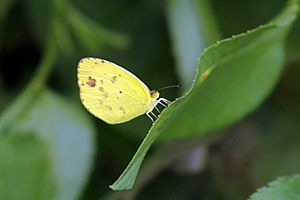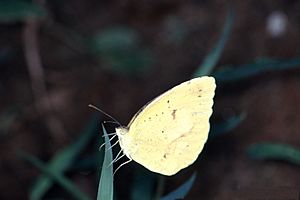Little yellow facts for kids
Quick facts for kids Little yellow |
|
|---|---|
 |
|
| Female E. l. euterpe in Jamaica | |
| Conservation status | |
| Scientific classification | |
| Kingdom: | |
| Phylum: | |
| Class: | |
| Order: | |
| Family: | |
| Genus: |
Eurema
|
| Species: |
E. lisa
|
| Binomial name | |
| Eurema lisa Boisduval & LeConte (1829)
|
|
| Subspecies | |
|
|
| Synonyms | |
|
|
The little yellow butterfly, also called the little sulphur, is a small, bright butterfly. Its scientific name is Eurema lisa. You can find this butterfly in Central America and the southern parts of North America. It belongs to the Coliadinae group of butterflies.
Description
The little yellow butterfly is quite small. Its wings usually spread between 32 and 44 millimeters wide. It's easy to spot because of its bright yellow color. Don't mix it up with the Sleepy orange butterfly, which is bigger and orange. The top side of its front wings has a wide dark edge. On the underside of its back wings, you'll see two black spots near the body.
Range and Habitat
The little yellow butterfly lives in many places. You can find it as far south as Costa Rica. It also lives north through the southern parts of the United States. Sometimes, you might see them in other parts of the United States. This happens when they fly north from warmer southern areas for the season. These butterflies like open spaces, especially old fields.
Life Cycle
The little yellow butterfly goes through several stages in its life. In warmer southern areas, they can have up to five generations (or "broods") in one year. In cooler northern areas, they usually have one to three broods.
On warm days, male butterflies fly around looking for females to mate with. After mating, the female butterfly lays her eggs. She places each egg by itself on the middle vein of a host plant leaf.
Larval Foods
When the eggs hatch, tiny caterpillars (larvae) emerge. These caterpillars eat specific plants to grow. Their favorite foods include:
- Cassia fasciculata
- Cassia nicitans
Adult Foods
Adult little yellow butterflies drink nectar from flowers. They especially like to feed on nectar from plants in the Aster family.
See also
 In Spanish: Pyrisitia lisa para niños
In Spanish: Pyrisitia lisa para niños



